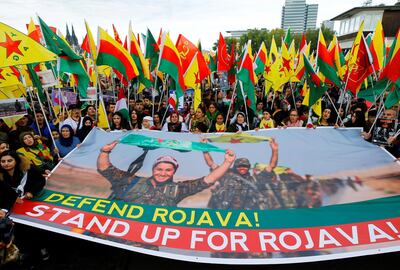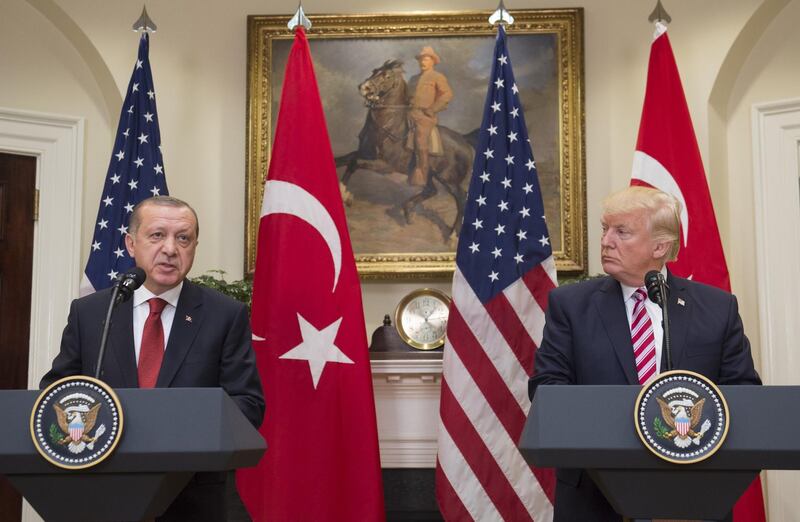As thousands of Britain’s Kurdish community gather for a mass protest today in central London, an assembly of Nato officials will be convening within earshot of their march.
Pro-Kurdish protesters uniting under the umbrella #RiseUp4Rojava are determined to highlight the plight of Kurds in Syria as Turkey advances across the border to carve out a so-called safe zone, where it plans to send the majority of its 3.6 million Syrian refugees.
Some of Nato's most crippling challenges have amalgamated in one crisis. How to handle Turkey is now a make-or-break issue for the alliance.
London’s weekend meeting is being held in advance of a 70th anniversary Nato summit in the British capital in December. A cloud hangs over the celebrations for the 29-country alliance. Attempts to mark a record of impressive cohesion throughout its history seem moot.
The challenges have shifted so much throughout that time – yet Nato has somehow endured. Indeed, Turkey’s role in Nato has long been the subject of commentary and questioning. In recent months these debates have increased markedly. The Syrian operation has moved the conundrum to a whole new phase.
The think tank Carnegie Europe has described Turkey as a functional ally within Nato. The chief attributes are its crucial geostrategic location and its large armed forces, which made a powerful contribution to missions in the Balkans and Afghanistan.
Turkey’s neighbourhood raises a thicket of issues for Nato that openly conflict with the core interests of the alliance.
European countries dominate Nato’s membership. At least one – Sweden – has responded to the Syrian offensive by suspending arms exports to Turkey.
Britain, France, Germany, Belgium and Poland issued a statement on Thursday that made clear their fears that Turkey was about to violate international law on forcing refugee returns. It cautioned against engineering demographic change in that part of Syria and said they would boycott any situation that resulted from the Turkish action if these were the outcomes.
Among European diplomats there is serious discussion of potential sanctions on Turkey. Fears over the resurgence of ISIS as a result of the weakening and dispersal of the Syrian Democratic Forces have put Europe on high alert. The dislocation of 100,000 people since the offensive began and Turkey’s threats to unleash a new migrant crisis has hit at the Europeans' greatest vulnerability.
The US Pentagon has also conceded that Turkey has put it in a “tough situation” with its actions. Mark Esper, the defence secretary, told a briefing last week that the US opposes and was “greatly disappointed” by the Turkish action. He said Turkish President Recep Tayyip Erdogan needed to de-escalate before the situation became irreparable.

US President Donald Trump is under fire for appearing to green light the operation and for abandoning the Kurds. Even he has issued threats to Turkey. The president tweeted that he could deploy the military against his Nato ally, destroy its economy with sanctions or mediate between the Turks and Kurds. US treasury officials were ordered to draw up punishing sanctions but these will not be implemented until the White House says so.
The conflagration comes just weeks after Turkey turned to Russia to provide the S-400 air defence system. With its coastline on the Black Sea, Turkey is also on the frontline of the competition between powers on the fringes of Europe.
It is another flashpoint where there has been a clunking blow to the cohesion of the alliance.
Nato constantly faces questions over its raison d'etre. A member of Nato's parliamentary assembly recently recounted the difficulty of explaining to schoolchildren just what Nato is and how it safeguards their future. Explaining the relationship with Turkey certainly cannot be condensed into simple terms.
It is undeniable that the Turkish campaign brings Nato into a new relationship with the Middle East.
For decades, the alliance has held the region at arm's length from its inner circle. It has been willing to offer dialogue, training initiatives and conferences but these remain limited tangible interactions. The post-9/11 involvement of Nato in Afghanistan has turned out to be a self-contained operation, in part because the US always chose to lead by itself there rather than working primarily through alliance structures.
A policy of cautious engagement with the Middle East was made possible by Turkey acting as both a member of the alliance and a buffer.
Now the western alliance has an open dispute inside the borders of an Arab state. There is a difference with the earlier examples of Iraq and Libya. Turkey regards it as a matter of domestic security and appears ready to incur international penalties to pursue its goals.
The Europeans are set on a track to deter Turkey. Much of Washington is gearing up for battle too.
Once again, the very purpose of Nato is on the line as the venerable institution turns 70.
Damien McElroy is the London bureau chief for The National





